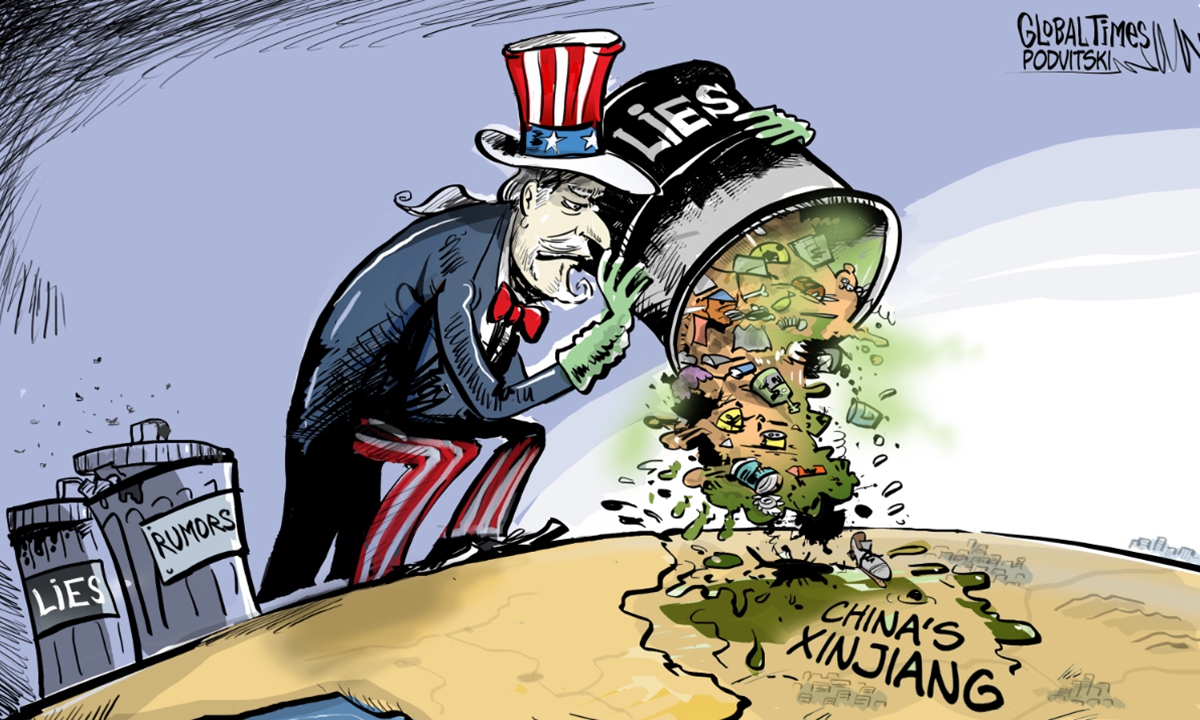US' push for Xinjiang-related bills a classic imperialist maneuver

Slandering Xinjiang -- the new normal of the "empire of lies" Illustration: Vitaly Podvitski
In recent years, US policies toward China have become increasingly Cold War-style. US' obsession with affairs related to Xinjiang Uygur Autonomous Region in Northwest China has reached a hysterical level. Under the push of extreme anti-China politicians like Senator Marco Rubio, the US Congress has successively concocted Uyghur Human Rights Policy Act of 2019 and Uyghur Forced Labor Prevention Act in 2021. The US Congress is persistent in promoting malicious laws targeting the Xinjiang region. This is a typical move of American-style new imperialism to maintain US' hegemony.
The core of Western imperialism is to maintain hegemony through external plunder. According to research, the new imperialist countries, represented by the US after the end of the World War II, mainly rely on their powerful military and economic strength to control international organizations and maintain financial hegemony, while implementing ideological offensives to control their interests. For example, the US has different means to warn those not pro-US countries or regions in the ideological field.
The tactic has at least two advantages: First, the cost is low, but the effect is significant. Compared with hot wars, disturbing "disobedient" US opponents in the ideological field, and even instigating "color revolutions," doesn't need high cost but the results are remarkable.
Second, the cultivation of pro-US ideology worldwide can provide legitimate support for its arbitrary interference in the international arena, and the social and political impacts of ideological infiltration are far-reaching.
Since the establishment of the Central Intelligence Agency (CIA) in 1947, the agency has been committed to exerting its influence in the field of cultural and scientific education through the international activities of NGOs under its control, promoting "American spirit" and improving CIA's own image via Hollywood movies. It has funded a large number of pro-US individuals around the world, who are good at leading the international pro-US public opinion.
US' promotions of Xinjiang-related bills are one of Washington's ideological offensives. The US Congress often uses "violation" of the Uygur human rights by the Chinese government as an excuse, which confuses right and wrong and turns black into white, to smear and isolate China, concealing US' own political motives.
The US government and American elites have been covering up rather than resolving its acute internal problems. When US imperialism's internal contradictions are difficult to alleviate, it becomes an inevitable option to divert its public's attention.
In this way, the US is compelled to rely on and utilize its military-industrial complex, stir up chaos around the world in order to profit from the turbulences while maintaining US' hegemony.
Against this backdrop, once its strategy toward China has been determined, the US will naturally focus on launching ideological offensives toward Xinjiang-related affairs. Xinjiang is a multi-ethnic, multi-cultural and multi-religious region where the level of economic and educational development is in urgent need of upgrading. This region was once heavily influenced by ethnic separatist forces, religious extremists and violent terrorists. From the perspective of geography, Xinjiang, as the northwestern border region of China, shares borders with many Central Asian countries. Various forces of the US have been trying to infiltrate in these countries for many years since the disintegration of the Soviet Union, which facilitates US' political maneuvers on Xinjiang affairs. It determines that Xinjiang is viewed by the US as an "easy target," and Washington thus decides to frequently promote all sorts of ill-intentioned bills related to Xinjiang.
With the gradual exposure of the poor human rights performance of the US itself at home and abroad, the US discourse in human rights will become less and less persuasive. However, we must be alert to the possibility that the US may play new tricks on Xinjiang-related topics. We must be ready to expose the lies of American imperialism, and fight imperialists resolutely.
The author is an associate researcher at Institute of Chinese Borderland Studies, Chinese Academy of Social Sciences.
Photos
Related Stories
- Xinhua Institute releases report on "origins, facts and perils" of U.S. military hegemony
- Commentary: America's bullying tactics for global hegemony
- Native American children sent to more boarding schools for assimilation: CNN
- "Toxic air" created by U.S. Maui wildfire to affect health for years: CBS News
- U.S. First Lady tests positive for COVID-19
- Abbas calls on U.S. to end sanctions, build normal relations with Palestine
- Australian politicians urge U.S. to end Assange extradition attempt
- U.S. Texas Senate to start impeachment trial of attorney general over corruption
- Thousands of festival attendees in U.S. Nevada struggle to leave after being trapped in mud due to torrential rain
- Floridians struggle for hurricane recovery as U.S. presidential politics swirl
Copyright © 2023 People's Daily Online. All Rights Reserved.









